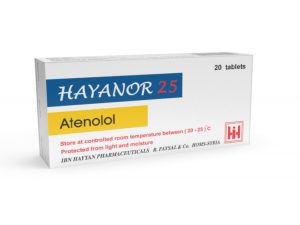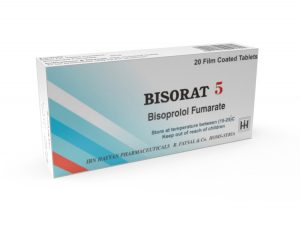


Composition:
Each film coated tablet contains: Bisoprolol fumarate 5 mg or 10 mg.
Properties:
Bisorate ( bisoprolol fumarate ) is a synthetic b1- selective blocking agents. It depresses plasma rennin activity, which leads to capillary dilatation. The blocking of b1- receptors reduces the heart action, thus reducing oxygen demand.
Bisorat is effective in eliminating or reducing the symptoms of angina pectoris.
Indications:
Bisorat is indicated in the management of hypertension and angina pectoris. It may be used alone or in combination with other anti-hypertensive agents.
Contraindications:
Bisoprolol is contraindicated in patients with cardiogenic shock, overt cardiac failure, second or third degree AV block, and marked sinus bradycardia.
Precautions:
– Bisoprolol should be used with caution in patients with renal or hepatic impairment.
– It must be used with caution in patients with peripheral circulatory disturbances such as Raynaud’s phenomenon.
– Bisorat should be used with caution by patients with chronic obstructive air way disease or asthma.
– If bronchospasm occurs it can be reversed by using bronchodilators ( i.e. Salbutamol) .
– It should be used with caution in diabetic patients especially elderly, since beta-blockers may mask some of the symptoms of hypoglycemia, particularly tachycardia, and also concomitant use may reduce glucose tolerance.
Pregnancy- Category C :
There are no adequate and well-controlled studies in pregnant women, Bisorat, should be used during pregnancy only if the potential benefit justifies the potential risk to the fetus.
If bisoprolol has been used during pregnancy, therapy should be discontinued 72 hours prior to the expected parturition due to the possibility of the occurrence of few adverse effects to the newborn child such as hypotension, hypoglycemia, and bradycardia.
Nursing Mothers:
– It is not known whether this drug is excreted in human milk. Because many drugs are excreted in human milk, caution should be exercised when Bisorate is administered to lactating women.
Pediatric Use:
Safety and effectiveness in children have not been established.
Drug Interactions:
The drug should not be combined with other beta-blocking agents. Bisorat may be potentiate the effect of other concurrently administered anti-hypertensive drugs such as reserpine, a- methyldopa, and clonidine. The therapy with clonidine must be discontinued for several days before bisoprolol administration. The drug should be used with caution with myocardial depressants, inhibitors of AV conduction such as calcium antagonist ( e.g. verapamil, diltiazem), or class 1 anti-arrhythmic ( such as disopyramide ). Rifampicin can reduce the elimination half-life of the drug. The effects of insulin or oral hypoglycaemic agents may be potentiated when used concurrently with the drug. Particular care should be taken when anesthetic agents which depress myocardial function ( such as ether, cyclopropane, and trichlorethylen) are used.
Side Effects:
Bisorat is usually well tolerated. The most common side effects associated with Bisorat are: perspiration, fatigue, dizziness, mild headache, dry mouth, muscle and joint ache. Other adverse events which may occasionally occur include insomnia, nausea, diarrhoea and sleep disturbances.
Skin reactions: Pruritus, rash.
Dosage and Administration:
The usual dose is 10 mg once daily. The maximum recommended dose is 20 mg daily. In some patients 5 mg daily may be adequate, especially in elderly. In patients with severe renal or liver impairment, the dose should not exceed 10 mg once daily.
To retain selectivity, it’s important to use the lowest effective dose.
-It is recommended to take bisoprolol in the morning on an empty stomach or with the breakfast.
Packing: Box contains 20 film coated tablets.
Storage: Store at temperature (20-25)° C .

Composition:
Each film coated tablet contains: Bisoprolol fumarate 5 mg or 10 mg.
Properties:
Bisorate ( bisoprolol fumarate ) is a synthetic b1- selective blocking agents. It depresses plasma rennin activity, which leads to capillary dilatation. The blocking of b1- receptors reduces the heart action, thus reducing oxygen demand.
Bisorat is effective in eliminating or reducing the symptoms of angina pectoris.
Indications:
Bisorat is indicated in the management of hypertension and angina pectoris. It may be used alone or in combination with other anti-hypertensive agents.
Contraindications:
Bisoprolol is contraindicated in patients with cardiogenic shock, overt cardiac failure, second or third degree AV block, and marked sinus bradycardia.
Precautions:
– Bisoprolol should be used with caution in patients with renal or hepatic impairment.
– It must be used with caution in patients with peripheral circulatory disturbances such as Raynaud’s phenomenon.
– Bisorat should be used with caution by patients with chronic obstructive air way disease or asthma.
– If bronchospasm occurs it can be reversed by using bronchodilators ( i.e. Salbutamol) .
– It should be used with caution in diabetic patients especially elderly, since beta-blockers may mask some of the symptoms of hypoglycemia, particularly tachycardia, and also concomitant use may reduce glucose tolerance.
Pregnancy- Category C :
There are no adequate and well-controlled studies in pregnant women, Bisorat, should be used during pregnancy only if the potential benefit justifies the potential risk to the fetus.
If bisoprolol has been used during pregnancy, therapy should be discontinued 72 hours prior to the expected parturition due to the possibility of the occurrence of few adverse effects to the newborn child such as hypotension, hypoglycemia, and bradycardia.
Nursing Mothers:
– It is not known whether this drug is excreted in human milk. Because many drugs are excreted in human milk, caution should be exercised when Bisorate is administered to lactating women.
Pediatric Use:
Safety and effectiveness in children have not been established.
Drug Interactions:
The drug should not be combined with other beta-blocking agents. Bisorat may be potentiate the effect of other concurrently administered anti-hypertensive drugs such as reserpine, a- methyldopa, and clonidine. The therapy with clonidine must be discontinued for several days before bisoprolol administration. The drug should be used with caution with myocardial depressants, inhibitors of AV conduction such as calcium antagonist ( e.g. verapamil, diltiazem), or class 1 anti-arrhythmic ( such as disopyramide ). Rifampicin can reduce the elimination half-life of the drug. The effects of insulin or oral hypoglycaemic agents may be potentiated when used concurrently with the drug. Particular care should be taken when anesthetic agents which depress myocardial function ( such as ether, cyclopropane, and trichlorethylen) are used.
Side Effects:
Bisorat is usually well tolerated. The most common side effects associated with Bisorat are: perspiration, fatigue, dizziness, mild headache, dry mouth, muscle and joint ache. Other adverse events which may occasionally occur include insomnia, nausea, diarrhoea and sleep disturbances.
Skin reactions: Pruritus, rash.
Dosage and Administration:
The usual dose is 10 mg once daily. The maximum recommended dose is 20 mg daily. In some patients 5 mg daily may be adequate, especially in elderly. In patients with severe renal or liver impairment, the dose should not exceed 10 mg once daily.
To retain selectivity, it’s important to use the lowest effective dose.
-It is recommended to take bisoprolol in the morning on an empty stomach or with the breakfast.
Packing: Box contains 20 film coated tablets.
Storage: Store at temperature (20-25)° C .